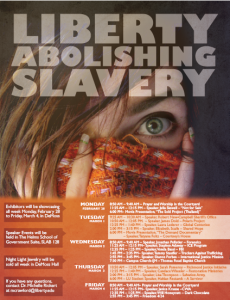The process of restoration for victims of domestic minor sex trafficking can be a long and difficult struggle for healing. Just as in any trauma case, first responders are crucial to the advancement of that journey. However, a shortage of shelters specifically dedicated to victims of sex trafficking has positioned organizations such as rape crisis centers to receive and care for these victims in the absence of more specialized services. In fact, the most commonly accepted estimate reveals that there are probably no more than 100 beds in the U.S. specifically dedicated to sex trafficking victims. When compared to the 100,000 individuals forced into the industry each year, it is clear that America is in desperate need of resources for DMST victims. So, how can rape crisis centers provide the necessary services to these victims with very specific needs?
Rape crisis centers may be one of the first responders in sex trafficking cases, especially with DMST victims, because of their hospital advocacy services and 24hr crisis hotline. In some cases, when a victim is admitted to a hospital for sexual trauma, the hospital will contact a rape crisis center immediately. Hospital advocates assist the victim during forensic exams and forensic interviews with the police in addition to providing the victim with valuable resources about the organization’s services. Rape crisis centers often offer free individual and group therapy that can assist a victim of sex trafficking in their long term healing process. Many rape crisis centers even offer legal advocacy services for those individuals seeking to heal through the justice system, or those who are unjustly being charged with prostitution. Rape crisis centers can be wonderful resources for DMST victims because of their deep understanding of victim empowerment, which is vital to the healing process, as well as their ability to help restore victims at their own pace.
While rape crisis centers can be pivotal in the healing process of sex trafficking victims, there are still many areas of improvement necessary in order to better assist individuals in this unique population. Like many other first responders, rape crisis center advocates and counselors are often not trained to recognize indicators of sex trafficking. This can hinder service provision for the unique needs of this victim population. Rape crisis center advocates and counselors need to be educated on the revealing signs that an individual has been trafficked and the appropriate treatment that individual should receive. Service providers may incorporate these tools by adjusting intake questions to reveal aspects of commercial sex exploitation. Fortunately, there are many online resources, including Shared Hope’s INTERVENE, to help rape crisis centers gain essential knowledge for identifying victims.
Rape crisis centers and other local resources can continue their fight against sexual abuse by expanding their efforts and knowledge to the issue of sex trafficking in their communities. Each of us has a role in this fight, and only by working in tandem at the national and local levels can organizations effectively combat the sexual exploitation of our children.
 To understand why the average age of entry is so young, we must understand the strategy used by pimps. When many people think of sex trafficking, they think of kidnapped children enslaved in a foreign brothel. However, the commercial sexual exploitation of minors occurs in every corner in the U.S. While kidnapping for the purpose of sex trafficking does occur in America, a common tactic used by pimps is trauma bonding. According to
To understand why the average age of entry is so young, we must understand the strategy used by pimps. When many people think of sex trafficking, they think of kidnapped children enslaved in a foreign brothel. However, the commercial sexual exploitation of minors occurs in every corner in the U.S. While kidnapping for the purpose of sex trafficking does occur in America, a common tactic used by pimps is trauma bonding. According to 







